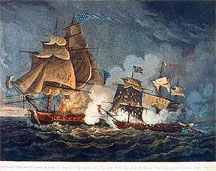1812–15: War of 1812
During the War of 1812, massive tax resistance was threatened by Federalists, ship owners, and bankers, who thought the issues were not important enough to go to war.
1820: Russia
Russia became the first country to establish legislation exempting pacifists from paying war taxes. Czar Alexander I issued a certificate of military tax exemption for Quakers.
1838: Resisters Include Abolitionists and Shakers
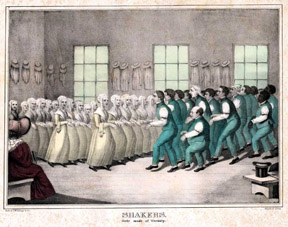 The New England Non-Resistance Society was founded in Boston at a special peace convention organized by William Lloyd Garrison, and favored war tax resistance. The Shakers in New Hampshire pledged to resist taxes for war no matter what the consequences.
The New England Non-Resistance Society was founded in Boston at a special peace convention organized by William Lloyd Garrison, and favored war tax resistance. The Shakers in New Hampshire pledged to resist taxes for war no matter what the consequences.
1846–48: Mexican-American War
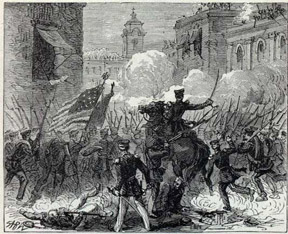 During the Mexican War, the Quakers refused to pay war taxes particularly because of the war’s aggressiveness and the threatened spread of slavery.
During the Mexican War, the Quakers refused to pay war taxes particularly because of the war’s aggressiveness and the threatened spread of slavery.
1846: Thoreau’s Civil Disobedience
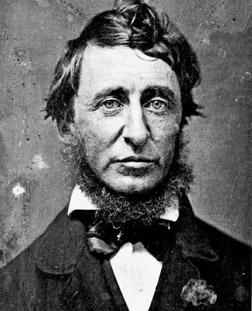 From 1841 to 1848 (except for 1843 when he was out of state), Henry David Thoreau refused to pay the annual $1.50 ($36 in 2010 dollars) Massachusetts poll tax because of his disgust for slavery and then the Mexican-American War (1846-1848). His July 1846 arrest and the night he spent in jail was recorded in his essay, “On the Duty of Civil Disobedience.” Thoreau’s action was aimed more at social change than personal removal from the war efforts. Against his wishes, aunt Maria paid the tax the next morning, which resulted in his release, according to Sam Staples, the tax collector and Thoreau’s jailer (interviewed by Samuel Arthur Jones, The Islander, Ann-Arbor, MI, 1898).
From 1841 to 1848 (except for 1843 when he was out of state), Henry David Thoreau refused to pay the annual $1.50 ($36 in 2010 dollars) Massachusetts poll tax because of his disgust for slavery and then the Mexican-American War (1846-1848). His July 1846 arrest and the night he spent in jail was recorded in his essay, “On the Duty of Civil Disobedience.” Thoreau’s action was aimed more at social change than personal removal from the war efforts. Against his wishes, aunt Maria paid the tax the next morning, which resulted in his release, according to Sam Staples, the tax collector and Thoreau’s jailer (interviewed by Samuel Arthur Jones, The Islander, Ann-Arbor, MI, 1898).
1861: Hungary
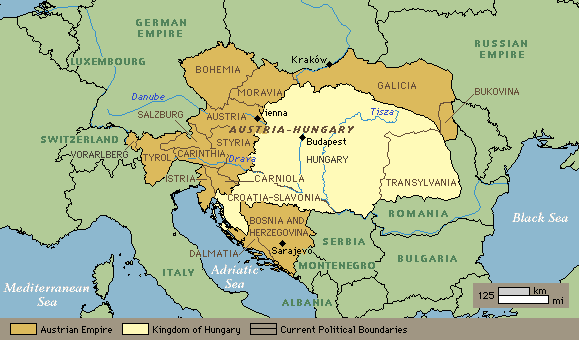
Map: Austria-Hungary created out of the Compromise of 1867 following years of Hungarian resistance to Austrian rule.
Hundreds of Hungarians stopped paying taxes to the Austrian Emperor, Franz Joseph I, who needed more money to fight Napoleon III. When property was seized for the unpaid taxes, auctioneers refused to auction it. When Austrian auctioneers were brought in, Hungarians refused to bid. It cost more to collect than what was collected.
1861–65: The American Civil War
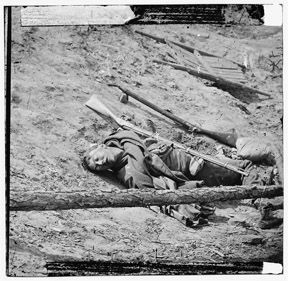 During the Civil War, many who had previously refused taxes decided that paying war taxes supported freeing slaves rather than killing people. Some Quakers continued to resist war taxes. The Society of Friends (Quakers) continued to support non-payment although they were more tolerant of those who paid than before.
During the Civil War, many who had previously refused taxes decided that paying war taxes supported freeing slaves rather than killing people. Some Quakers continued to resist war taxes. The Society of Friends (Quakers) continued to support non-payment although they were more tolerant of those who paid than before.
1866: Universal Peace Union (UPU)
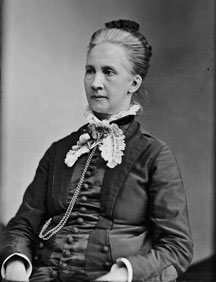 After the Civil War, the Universal Peace Union (UPU) was formed. Aroused by the horror of what the war had done to the country, the UPU called for immediate disarmament, denounced imperialism, and urged a boycott of war taxes. A number of its members were jailed or had property seized. Belva Ann Lockwood (photo) was the first woman to run for president of the United States and a leader of the UPU.
After the Civil War, the Universal Peace Union (UPU) was formed. Aroused by the horror of what the war had done to the country, the UPU called for immediate disarmament, denounced imperialism, and urged a boycott of war taxes. A number of its members were jailed or had property seized. Belva Ann Lockwood (photo) was the first woman to run for president of the United States and a leader of the UPU.
pre-1700s • 1700s • 1800s • 1900–1959 • 1960s • 1970s • 1980s • 1990s • 2000s • 2010s • 2020s
